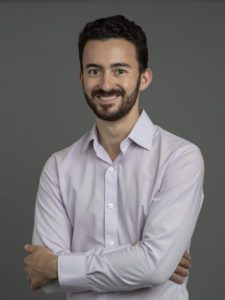This Is Our Lane: Finding Your Voice for Social Justice | Benjamin Margolis, MD

Benjamin Margolis, MD
As I sat down to think about my contribution to this forum as a member of the LGBTQ community, I had an unsettled feeling of not quite knowing how my perspective as a cisgender, white, male could best contribute to a discussion about equity, representation and action. This is my third draft, and it won’t be perfect. The process of writing and revising this piece has been more personally formative and educational than I could have imagined, and frames my contribution.
In my first draft, I explored my experience of being an out gay physician during training. I recounted the open arms I have experienced from senior faculty and colleagues, and the utter normalcy of my then boyfriend’s presence at our yearly intern welcome event and graduations. Other than navigating the awkward issue of the well-intentioned patient assuming I was straight (let’s be honest here, only occasionally), I can’t really cite much adversity my LGBTQ identity has caused me in my adult life. Draft one ended with a rosy, half-spirited call to action that it would be great if everyone could enjoy equality as a fact of life as I have as a gay physician.
Though important to share my own experience, ultimately, that draft felt a little cringe-worthy as I started to reflect on my own privilege of being a white male and how little I have done in my daily life to combat racism and discrimination. I thought my relatively rightward pointed moral compass was enough to be a member of society who supports equality and justice. In draft two, I wrote about how a Broadway show that tackled racism in a jarring way left a lasting impact on me and served as a sort of “awakening.” I glossed over the absurdity that it took 31 years and paying 100 dollars to viscerally feel how ingrained racism is in our society and the severity of its impact on many around me at all times. It’s a bit shameful to admit, and the truth of it unsettles me, but that’s a good thing. I then wrote about the experience my own implicit bias of not accurately identifying a Black person in scrubs at my institution as a physician. I composed more drafts before finally, I tried to look inward and think about how I could do better.
I only really started to see my own shortcomings and blind spots when I asked friends of mine (physician friends who are people of color) to read what I wrote. I saw that I had failed to acknowledge the systemic and structural racism that leads to under representation of people of color in medicine. The discourse that followed was eye-opening and formative as I realized that my words on inequality and racism exposed an underdeveloped worldview. Their commentary helped me see how a few well-intentioned words can say much more about me than the topic I was writing about. Since these discussions, I have been trying to figure out where I fit in to address racism and inequality on a daily basis in a way I had not before. Much of the equality and acceptance I experience in my daily life is the result of groundwork laid by transgender people of color, and it’s about time I acknowledged that with action. I am reading a book and am learning what it means to be an anti-racist. I am acknowledging that for most of my life I have been more of a complacent bystander and thinking of more deliberate action in equity for all communities.
If I can do anything with this entry, I hope to inspire colleagues who fit a similar description to myself to look inward. Think about if you’ve done anything to actively combat racism in your professional or personal life. Saying to yourself “well, I’m not racist” isn’t quite good enough. Consider how all of us may occupy positions of both experiencing bias and privilege due to our own identities of race, gender and/or sexual identity or economic or professional status. Consider writing something about racism or your role in the racial justice movement and showing it to a person of color. I bet it will lead to discussions that will make you a more understanding person. Consider calling up a friend and asking them to have an honest conversation about race and equality to understand how you can be better. These are the things I have done in the past few months, and I have been grateful for the patience and interest of those around me to help me grow.
Benjamin Margolis, MD, recently finished his gynecologic oncology fellowship at NYU Langone Health and will be starting as an assistant professor of gynecologic oncology at Albany Medical Center in Albany, New York.
This column is sponsored by an unrestricted grant from GSK. Sponsorship excludes editorial input. Content developed by the SGO Diversity, Inclusion & Health Equity Committee.